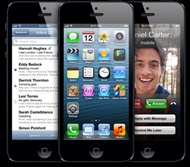Judge dismisses iPhone lawsuit without trial
27 Sep 2008
Now this is one lawsuit Apple will not have to worry about anymore. Already under fire for supposedly misleading customers over the network capabilities of its latest product iPhone 3G, executives at the technology major can breathe a sigh of relief that an earlier suit on an earlier product - the original iPhone - has been dismissed. (See: iPhone commercial banned in the UK over misleading claims and Lawsuit filed against Apple by dissatisfied iPhone 3G customer)
 Last year, a certain Jose Trujillo launched the first (but far from the last) class action suit against Apple over the iPhone. He alleged that Apple misled customers by not telling them that the iPhone battery was not user-replaceable and also that the battery would require annual replacement, with Apple charging $86 for the service. He felt it was unfair that the companies required a two-year service agreement when the iPhone's battery would presumably not last that long.
Last year, a certain Jose Trujillo launched the first (but far from the last) class action suit against Apple over the iPhone. He alleged that Apple misled customers by not telling them that the iPhone battery was not user-replaceable and also that the battery would require annual replacement, with Apple charging $86 for the service. He felt it was unfair that the companies required a two-year service agreement when the iPhone's battery would presumably not last that long.
However, US District Judge Matthew F Kennelly in Chicago granted Apple's request that he dismiss the lawsuit on the evidence and the law without a trial - a so-called summary judgment. He noted that Trujillo actually dropped two of his three factual bases for his complaints against Apple, the last being that Apple never disclosed the limited life of the iPhone battery and that it must be returned to Apple for service.
''Apple disclosed on the outside of the iPhone package that the battery has ''limited recharge cycles and may eventually need to be replaced by Apple service provider,'' '' Kennelly wrote in his 23 September opinion, quoting the packaging. ''Under the circumstances, no reasonable jury could find that deception occurred.''
AT&T Inc, the largest US telephone company and the exclusive iPhone service provider, remains a defendant in the case.
On 22 September, Judge Kennelly denied Dallas-based AT&T's motion to compel arbitration, as it said the service agreement demanded, and dismiss the suit.
Kennelly said that at the time Trujillo bought an iPhone, he "did not have access to a paper copy of any documents explaining or referencing'' the "terms of service, including in particular the arbitration requirement.''



















